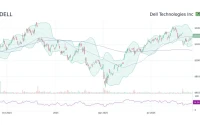When I saw the news flash across my screen—Bitcoin cresting $126,000, Morgan Stanley formally advising a 4% portfolio allocation—I didn't feel the frantic thrill of a trader watching a stock rocket. I honestly just sat back in my chair and smiled. Because this isn't just another bull run. This isn't a bubble. This is a graduation ceremony.
For over a decade, we’ve talked about Bitcoin in abstract, almost mythical terms. "Digital gold." "A store of value." "A hedge against uncertainty." They were powerful ideas, but for many, they remained just that—ideas. What we're witnessing right now, in the fall of 2025, is the moment those ideas are being forged into something real, something tangible in the balance sheets of the world's most powerful financial institutions. This isn't a speculative frenzy; it's a fundamental, structural shift in the architecture of global finance.
What we're seeing is a system under pressure, seeking a release valve. Gold, the ancient and trusted store of value, is smashing through $3,900 an ounce. At the same time, Bitcoin is hitting new all-time highs. This isn't a coincidence. It’s a coordinated flight to scarcity, a direct response to a world grappling with geopolitical turmoil, endless wars, and a US government shutdown that’s shaking faith in the dollar itself.
JPMorgan has a term for this: the "debasement trade." In simpler terms, it means that when people start to worry that the money printed by governments is losing its value, they run toward assets that can't be arbitrarily created. You can't print more gold, and you certainly can't "print" more Bitcoin. This is the code-enforced promise that has been Bitcoin's core thesis from day one. And right now, that promise is being heard loud and clear, not just by cypherpunks, but in the boardrooms on Wall Street.
The Great Rebalancing
For years, the conversation was dominated by the question, "Is Bitcoin real?" That question is now obsolete. The new question, the one being asked by the likes of Morgan Stanley and VanEck, is "How much should we own?"
Think about the sheer scale of what's happening. Morgan Stanley Advises Up to 4% Bitcoin Allocation in Portfolios. This isn't a fringe analyst's hot take; it's a formal recommendation from their Global Investment Committee. They’re advising clients to rebalance these positions quarterly, treating Bitcoin not as a lottery ticket, but as a core component of a diversified strategy, right alongside real assets.
This is the kind of breakthrough that reminds me why I got into this field in the first place. It’s the institutional green light we’ve been waiting for, and the speed of this adoption is just staggering—it means the gap between the fringe financial experiments of yesterday and the mainstream investment products of tomorrow is closing faster than we can even comprehend.

This institutional embrace provides the context for VanEck’s seemingly audacious prediction: Bitcoin reaching half of gold's market capitalization. At today's numbers, that implies a future `bitcoin price` of around $644,000. Is that possible? Derek Lim at Caladan suggests it’s a realistic target over the next 5 to 10 years. This isn't about a sudden, parabolic spike. It’s about a steady, generational reallocation of capital. We are witnessing the early stages of a multi-trillion-dollar migration toward a new kind of asset.
This is a moment that feels analogous to the invention of the double-entry bookkeeping system in Renaissance Italy. That innovation didn't just help merchants count their money; it created a new language for commerce, capital, and trust, paving the way for the birth of modern capitalism. Similarly, Bitcoin isn't just a new asset. It's a new ledger. A global, transparent, and immutable system for verifying ownership and value. What happens when the world’s wealth managers realize they now have access to a truly global, neutral asset for the first time in history?
The Code and the Committee Room
Of course, this journey won't be a straight line. The on-chain data tells a fascinating story. Right now, Bitcoin STH Whale Profits Hit $10.1 Billion, Highest For The Cycle. That’s a staggering sum, and the temptation to take some of that profit off the table is very, very real. We should expect volatility. We should expect corrections. That is the nature of a maturing market finding its footing.
But this is where we have to be thoughtful. With this immense power and potential comes a profound responsibility. The goal isn't just to see the `bitcoin price usd` go up; it's to build a more resilient and accessible financial system on top of this new foundation. We must ensure that the tools being built—from Layer 2 solutions that solve scalability to user-friendly `bitcoin ETF` products—are designed to empower the individual, not just enrich the institutions.
The current rally is being fueled by more than just institutional demand. It's also being driven by a clear political tailwind from a re-elected Trump administration that has openly championed the crypto sector. This political validation, combined with the economic uncertainty of the government shutdown, has created a perfect storm. As Geoffrey Kendrick of Standard Chartered noted, this isn't just noise; Bitcoin is now trading in direct relation to "US government risks." It has become a barometer for faith in the system itself.
So where do we go from here? Standard Chartered sees $135,000 on the horizon. VanEck is mapping a path to over half a million dollars. These aren't just numbers on a chart. They are signposts on a road to a different kind of future, one where value isn't dictated solely by central banks, but is also secured by mathematics and a global consensus of peers.
Imagine a world where international trade is settled instantly on a neutral ledger. Imagine a world where central banks hold a provably scarce digital asset as part of their reserves to hedge against geopolitical risk. This isn't science fiction. It's the long-term vision being articulated by some of the smartest minds in finance, and we're seeing the first chapter being written today.
The Dawn of a New Ledger
We've officially moved past the point of debate. The arguments over "if" Bitcoin has value are over. The only conversation that matters now is what we, as a global society, decide to build with it. For the first time, we have a global, apolitical, and digitally native store of value that anyone with an internet connection can access. This isn't just another asset class. It is a foundational protocol for trust in a world that desperately needs it. The ledger is open, the code is running, and the next chapter is ours to write.









